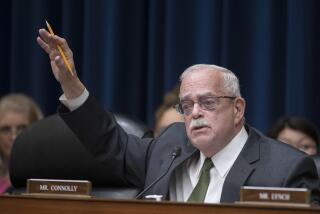Iraq reports continued decline in civilian death toll
- Share via
BAGHDAD — Civilian deaths from war-related violence showed a substantial decline for another month, according to figures released Friday, but political tensions in the capital were heightened after U.S. and Iraqi forces detained the son and several associates of a leading Sunni Arab lawmaker.
The legislator, Adnan Dulaimi, said the detentions during overnight raids at his office and home were an attempt to silence his criticism of the Shiite-led government. Dulaimi heads the main Sunni bloc in the parliament, the Iraqi Accordance Front, or Tawafiq.
“This is an attempt to get me and Tawafiq to soften our stance,” he said. His son Makki, a security guard and dozens of associates were taken into custody after a killing and the discovery of a car bomb nearby.
The U.S. military said in a statement that Dulaimi’s residence was being guarded by Iraqi security forces, who had asked him to remain inside “for his own security.”
The raids came a day after Tawafiq’s 44-member bloc joined other lawmakers in boycotting the legislative session to derail Prime Minister Nouri Maliki’s attempt to appoint new Cabinet ministers. The walkout denied parliament the necessary quorum needed for a vote.
There was no indication that the detentions were linked to the boycott, but together the incidents illustrated the lack of political conciliation at the national level. With violence decreasing, U.S. officials say this is the time for lawmakers to set aside their differences and pass legislation aimed at stabilizing the country.
The civilian death count for November, released by the Iraqi government, showed 530 Iraqis were killed in bombings and other war-related violence, compared with 758 in October. The toll was 884 in September.
The number of U.S. troops killed in November was 38, the same total as October, according to the independent website icasualties.org. A U.S. soldier died Friday in a roadside bomb blast in Diyala province, the military said, bringing to at least 3,882 the number of U.S. forces killed in Iraq since the start of the war in March 2003.
Both U.S. troop and Iraqi civilian deaths have declined steadily in the last few months. The November civilian toll is less than half the total of June, when the last of an extra 28,500 U.S. troops arrived in Iraq to quell sectarian warfare and insurgent violence. That month, 1,227 civilians were reported killed.
The statistics on civilian deaths come from Iraq’s Health Ministry, the only Iraqi government agency providing such casualty counts. For months, its numbers have been higher than those compiled by U.S. forces. However, U.S. military officials note that the ministry’s numbers, as well as tolls compiled by independent organizations such as icasualties.org, have mirrored U.S. counts in showing a decline.
An aim of the troop buildup was to create a stable environment so politicians could focus on lawmaking rather than security issues and sectarian rivalries. U.S. military and political leaders have said that Iraqi politicians have a window in which to mend fences and that sectarian violence could rise again if lawmakers do not act.
The U.S. military and Iraqi security officials said Dulaimi’s offices and home in the Adil neighborhood were searched after the slaying late Thursday of a guard at a nearby checkpoint.
The statement described a confusing chain of events that began with U.S. and Iraqi security forces responding to a report of the killing. A car that witnesses linked to the death was found outside Dulaimi’s office compound, leading troops to enter and arrest several guards.
The troops discovered a car bomb outside the compound, and one of the detained security guards was found to have keys to the vehicle, according to the U.S. statement.
Another raid was then carried out on Dulaimi’s residence, less than a quarter of a mile from the office, and dozens more people were detained.
During the operations, three Iraqi civilians were injured: two when Iraqi security forces fired on a man attempting to flee, and one during the controlled detonation of the car bomb. Five U.S. troops suffered minor injuries in the explosion as well, the U.S. statement said.
It said more than 40 “suspected criminals” were detained. Dulaimi put the number at 53, including his son and Muhannad Esawi, the spokesman for Dulaimi’s political party.
Dulaimi denied that any of the detainees were involved in the slaying or with the car bomb, as alleged by Brig. Gen. Qassim Musawi, an Iraqi security forces spokesman. Speaking on Al Iraqiya television, Musawi said one of Dulaimi’s guards had committed the killing and then sought shelter in the politician’s office compound.
Musawi did not accuse Dulaimi of involvement.
Dulaimi has been at the center of a number of security scandals. In October 2006, one of his guards was arrested at Dulaimi’s home on suspicion of plotting a suicide attack in Baghdad’s high-security Green Zone, which houses the parliament, the U.S. Embassy and most Iraqi government offices.
Dulaimi was not suspected of involvement, but Shiite lawmakers have accused him of associating with Sunni Muslim insurgent groups and of orchestrating forced expulsions of Shiites from his neighborhood.
--
Times staff writers Peter Spiegel and Wail Alhalith contributed to this report.
More to Read
Sign up for Essential California
The most important California stories and recommendations in your inbox every morning.
You may occasionally receive promotional content from the Los Angeles Times.














